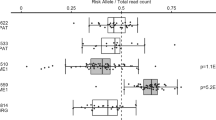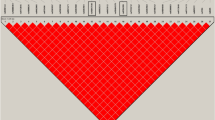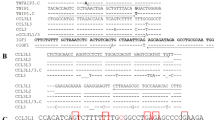Abstract
Genome-wide association studies have revealed that the 16p13 chromosomal region, including CLEC16A, DEXI, CIITA and SOCS1, is associated with susceptibility to autoimmune diseases. As non-coding single-nucleotide polymorphisms (SNPs) may confer susceptibility to disease by affecting expression of nearby genes, we examined whether autoimmune-associated intronic CLEC16A SNPs (rs12708716, rs6498169 and rs7206912) correlate with the expression of CLEC16A itself as well as neighboring genes in whole-blood and thymic samples. Real-time quantitative PCR analyses show that SOCS1 and DEXI expression was lower in thymic samples carrying at least one of the CLEC16A risk alleles compared with non-carriers of the risk allele. Linear regression analysis revealed a significant correlation between the expression level of CLEC16A and that of SOCS1 and DEXI in thymic samples. These data indicate a possible regulatory role for multiple sclerosis-associated non-coding CLEC16A SNPs and a common control mechanism for the expression of CLEC16A, SOCS1 and DEXI.
This is a preview of subscription content, access via your institution
Access options
Subscribe to this journal
Receive 6 digital issues and online access to articles
$119.00 per year
only $19.83 per issue
Buy this article
- Purchase on Springer Link
- Instant access to full article PDF
Prices may be subject to local taxes which are calculated during checkout


Similar content being viewed by others
References
Hakonarson H, Grant SF, Bradfield JP, Marchand L, Kim CE, Glessner JT et al. A genome-wide association study identifies KIAA0350 as a type 1 diabetes gene. Nature 2007; 448: 591–594.
The International Multiple Sclerosis Genetics Consortium. The expanding genetic overlap between multiple sclerosis and type I diabetes. Genes Immun 2009; 10: 11–14.
Todd JA, Walker NM, Cooper JD, Smyth DJ, Downes K, Plagnol V et al. Robust associations of four new chromosome regions from genome-wide analyses of type 1 diabetes. Nat Genet 2007; 39: 857–864.
Skinningsrud B, Husebye ES, Pearce SH, McDonald DO, Brandal K, Wolff AB et al. Polymorphisms in CLEC16A and CIITA at 16p13 are associated with primary adrenal insufficiency. J Clin Endocrinol Metab 2008; 93: 3310–3317.
Marquez A, Varade J, Robledo G, Martinez A, Mendoza JL, Taxonera C et al. Specific association of a CLEC16A/KIAA0350 polymorphism with NOD2/CARD15(-) Crohn’s disease patients. Eur J Hum Genet 2009; 17: 1304–1308.
Rubio JP, Stankovich J, Field J, Tubridy N, Marriott M, Chapman C et al. Replication of KIAA0350, IL2RA, RPL5 and CD58 as multiple sclerosis susceptibility genes in Australians. Genes Immun 2008; 9: 624–630.
Sawcer S, Hellenthal G, Pirinen M, Spencer CC, Patsopoulos NA, Moutsianas L et al. Genetic risk and a primary role for cell-mediated immune mechanisms in multiple sclerosis. Nature 2011; 476: 214–219.
Ferreira RC, Pan-Hammarstrom Q, Graham RR, Gateva V, Fontan G, Lee AT et al. Association of IFIH1 and other autoimmunity risk alleles with selective IgA deficiency. Nat Genet 2010; 42: 777–780.
Skinningsrud B, Lie BA, Husebye ES, Kvien TK, Forre O, Flato B et al. A CLEC16A variant confers risk for juvenile idiopathic arthritis and anti-cyclic citrullinated peptide antibody negative rheumatoid arthritis. Ann Rheum Dis 2010; 69: 1471–1474.
Wellcome Trust Case Control Consortium. Genome-wide association study of 14,000 cases of seven common diseases and 3000 shared controls. Nature 2007; 447: 661–678.
Mero IL, Ban M, Lorentzen AR, Smestad C, Celius EG, Saether H et al. Exploring the CLEC16A gene reveals a MS-associated variant with correlation to the relative expression of CLEC16A isoforms in thymus. Genes Immun 2011; 12: 191–198.
Hafler DA, Compston A, Sawcer S, Lander ES, Daly MJ, De Jager PL et al. Risk alleles for multiple sclerosis identified by a genomewide study. N Engl J Med 2007; 357: 851–862.
Nischwitz S, Cepok S, Kroner A, Wolf C, Knop M, Muller-Sarnowski F et al. More CLEC16A gene variants associated with multiple sclerosis. Acta Neurol Scand 2011; 123: 400–406.
Bronson PG, Caillier S, Ramsay PP, McCauley JL, Zuvich RL, De Jager PL et al. CIITA variation in the presence of HLA-DRB1*1501 increases risk for multiple sclerosis. Hum Mol Genet 2010; 19: 2331–2340.
Vandenbroeck K, Alvarez J, Swaminathan B, Alloza I, Matesanz F, Urcelay E et al. A cytokine gene screen uncovers SOCS1 as genetic risk factor for multiple sclerosis. Genes Immun 2012; 13: 21–28.
Zuvich RL, McCauley JL, Oksenberg JR, Sawcer SJ, De Jager PL, Aubin C et al. Genetic variation in the IL7RA/IL7 pathway increases multiple sclerosis susceptibility. Hum Genet 2010; 127: 525–535.
Zuvich RL, Bush WS, McCauley JL, Beecham AH, De Jager PL, Ivinson AJ et al. Interrogating the complex role of chromosome 16p13.13 in multiple sclerosis susceptibility: independent genetic signals in the CIITA-CLEC16A-SOCS1 gene complex. Hum Mol Genet 2011; 20: 3517–3524.
Hoppenbrouwers IA, Aulchenko YS, Janssens AC, Ramagopalan SV, Broer L, Kayser M et al. Replication of CD58 and CLEC16A as genome-wide significant risk genes for multiple sclerosis. J Hum Genet 2009; 54: 676–680.
Davison LJ, Wallace C, Cooper JD, Cope NF, Wilson NK, Smyth DJ et al. Long-range DNA looping and gene expression analyses identify DEXI as an autoimmune disease candidate gene. Hum Mol Genet 2012; 21: 322–333.
Nica AC, Montgomery SB, Dimas AS, Stranger BE, Beazley C, Barroso I et al. Candidate causal regulatory effects by integration of expression QTLs with complex trait genetic associations. PLoS Genet 2010; 6: e1000895.
Dubois PC, Trynka G, Franke L, Hunt KA, Romanos J, Curtotti A et al. Multiple common variants for celiac disease influencing immune gene expression. Nat Genet 2010; 42: 295–302.
Swanberg M, Lidman O, Padyukov L, Eriksson P, Akesson E, Jagodic M et al. MHC2TA is associated with differential MHC molecule expression and susceptibility to rheumatoid arthritis, multiple sclerosis and myocardial infarction. Nat Genet 2005; 37: 486–494.
Steimle V, Otten LA, Zufferey M, Mach B . Complementation cloning of an MHC class II transactivator mutated in hereditary MHC class II deficiency (or bare lymphocyte syndrome). Cell 1993; 75: 135–146.
Fenner JE, Starr R, Cornish AL, Zhang JG, Metcalf D, Schreiber RD et al. Suppressor of cytokine signaling 1 regulates the immune response to infection by a unique inhibition of type I interferon activity. Nat Immunol 2006; 7: 33–39.
Edgar AJ, Birks EJ, Yacoub MH, Polak JM . Cloning of dexamethasone-induced transcript: a novel glucocorticoid-induced gene that is upregulated in emphysema. Am J Respir Cell Mol Biol 2001; 25: 119–124.
Cookson W, Liang L, Abecasis G, Moffatt M, Lathrop M . Mapping complex disease traits with global gene expression. Nat Rev Genet 2009; 10: 184–194.
Nicolae DL, Gamazon E, Zhang W, Duan S, Dolan ME, Cox NJ . Trait-associated SNPs are more likely to be eQTLs: annotation to enhance discovery from GWAS. PLoS Genet 2010; 6: e1000888.
Catlett IM, Hedrick SM . Suppressor of cytokine signaling 1 is required for the differentiation of CD4+ T cells. Nat Immunol 2005; 6: 715–721.
Zhan Y, Davey GM, Graham KL, Kiu H, Dudek NL, Kay TW et al. SOCS1 negatively regulates the production of Foxp3+ CD4+ T cells in the thymus. Immunol Cell Biol 2009; 87: 473–480.
Durelli L, Conti L, Clerico M, Boselli D, Contessa G, Ripellino P et al. T-helper 17 cells expand in multiple sclerosis and are inhibited by interferon-beta. Ann Neurol 2009; 65: 499–509.
Takahashi R, Nishimoto S, Muto G, Sekiya T, Tamiya T, Kimura A et al. SOCS1 is essential for regulatory T cell functions by preventing loss of Foxp3 expression as well as IFN-{gamma} and IL-17A production. J Exp Med 2011; 208: 2055–2067.
Fu J, Wolfs MG, Deelen P, Westra HJ, Fehrmann RS, Te Meerman GJ et al. Unraveling the regulatory mechanisms underlying tissue-dependent genetic variation of gene expression. PLoS Genet 2012; 8: e1002431.
Bhattacharyya S, Zhao Y, Kay TW, Muglia LJ . Glucocorticoids target suppressor of cytokine signaling 1 (SOCS1) and type 1 interferons to regulate Toll-like receptor-induced STAT1 activation. Proc Natl Acad Sci USA 2011; 108: 9554–9559.
Rhen T, Cidlowski JA . Antiinflammatory action of glucocorticoids--new mechanisms for old drugs. N Engl J Med 2005; 353: 1711–1723.
Viken MK, Olsson M, Flam ST, Forre O, Kvien TK, Thorsby E et al. The PTPN22 promoter polymorphism −1123G>C association cannot be distinguished from the 1858C>T association in a Norwegian rheumatoid arthritis material. Tissue Antigens 2007; 70: 190–197.
Acknowledgements
This study was funded by grants from The South-Eastern Norway Regional Health Authority, Ullevål University Hospital Scientific Advisory Council (VIRUUS), Biogen Idec Norway AS, The Norwegian Diabetes Association and the Odd Fellow society. We would like to thank Harald Lindeberg and the Norwegian Bone Marrow Registry for providing samples; Marte Viken, Siri Flåm, Hege D Sollid and Hanne Sæther for collecting and preparing the RNA samples; and Christian Page for help with statistical analyses.
Author information
Authors and Affiliations
Corresponding author
Ethics declarations
Competing interests
Inger-Lise Mero has received an unrestricted grant for running expenses in this project from Biogen Idec Norway AS.
Rights and permissions
About this article
Cite this article
Leikfoss, I., Mero, IL., Dahle, M. et al. Multiple sclerosis-associated single-nucleotide polymorphisms in CLEC16A correlate with reduced SOCS1 and DEXI expression in the thymus. Genes Immun 14, 62–66 (2013). https://doi.org/10.1038/gene.2012.52
Received:
Revised:
Accepted:
Published:
Issue Date:
DOI: https://doi.org/10.1038/gene.2012.52
Keywords
This article is cited by
-
The type 1 diabetes candidate gene Dexi does not affect disease risk in the nonobese diabetic mouse model
Genes & Immunity (2020)
-
The Genetic Contribution to Type 1 Diabetes
Current Diabetes Reports (2019)
-
DEXI, a candidate gene for type 1 diabetes, modulates rat and human pancreatic beta cell inflammation via regulation of the type I IFN/STAT signalling pathway
Diabetologia (2019)
-
Polymorphic Variants of Immune Response Genes as a Risk Factor for the Development of Primary Progressive Multiple Sclerosis
Neuroscience and Behavioral Physiology (2018)
-
Clec16a is Critical for Autolysosome Function and Purkinje Cell Survival
Scientific Reports (2016)



